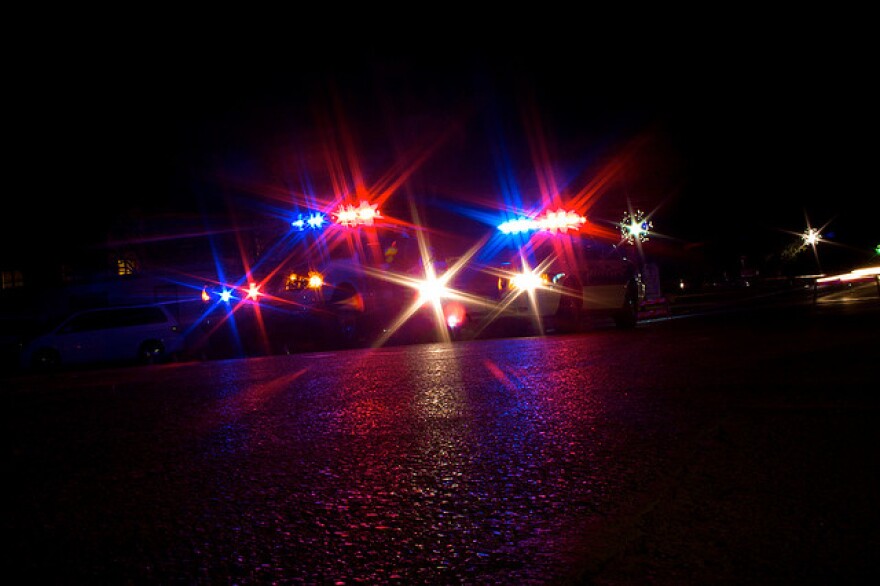Essential workers are balancing the stress of possible infection on the job, with family life and isolation caused by social distancing, and this includes law enforcement.
Police officers are not traditionally perceived as the type to talk about feelings.
But the Nashua Police Department has been looking at different ways to help officers cope with the stress and trauma of the job.
This story is part of our series Lifelines: Addressing Trauma in the Age of COVID-19
What are you questions about coronavirus? Submit them to NHPR here.
Detective Sgt. Chad MacGregor is with the special investigations unit at the Nashua Police Department. He’s been there for 15 years, and in that time he’s seen a lot.
“Special investigations deals with domestic violence, crimes against children, sexual assault, elder abuse, as well as tracking sex offenders and internet crimes against children,” MacGregor said. “So it’s a pretty involved unit.”
Doing this kind of work can lead to two different types of trauma.
There’s the cumulative career trauma that develops over time, and there’s the trauma that results from a critical incident that overwhelms an officer’s coping mechanisms.
One of the things that helps is peer support.
In early March, before the pandemic, I attended a peer support training session at the Nashua Police Department.
The instructor, Tom Greenhalgh, has been in public safety for over 35 years, and he says when he started, people didn’t talk about mental health or trauma.

“When I started, there was none of this. It was very informal,” Greenhalgh said. “You might find a person on the job that you could talk to or a friend, or a family member, but there was really no formal mental health support for law enforcement. If someone was having a problem, you either figured out how to deal with it on your own, or you get referred to a clinician.”
Here, officers learn how to check in with each other, and hold formal debrief sessions when an officer is really struggling. As part of the training, they’re asked to reflect on their own experiences and what kind of trauma they might be holding onto.
Manchester Police Officer Kevin Lally attended the session. He says, when officers take care of their own physical and mental health, they can do their jobs more effectively.
“I think law enforcement and first responders, we’re seen as tough or gruff because we have hardened ourselves to this, or we’ve just seen it all,” Lally said. “And it kind of has a negative reflection to the public, the way they perceive us. But we’re trying overall to become better, not only empathizing and sympathizing, but also helping ourselves so we can better help the public.”
But Chad MacGregor at Nashua PD says there’s still a cultural shift that needs to take place within some departments.
“The line officers need to embrace the notions of it’s okay to need help. It’s okay to not be okay,” MacGregor said. “And the administration needs to embrace and advocate for the wellbeing of their officers.”
Studies show the life expectancy for police officers is 22 years less than the average person with the effects of psychological stress on the body as a contributing factor.
“Unfortunately law enforcement suicide is on the rise,” MacGregor said. “That’s obviously the worst case scenario, in which that’s something that we’re absolutely trying to take steps to avoid, but it can be that severe.”
Last year, the Nashua Police Department lost one of their own to suicide -- Captain Jon Lehto.
Police Chief Michael Carignan was transparent with the public about how Lehto had died. He and others at Nashua PD want to change how law enforcement agencies talk about mental health and trauma.
MacGregor says the department has taken a holistic approach in educating officers on how to cope.
“We’ve had seminars on sleep, seminars on nutrition, hydration as well as exercise physiology to better improve the overall quality of life,” MacGregor said. “So it’s a whole body approach. It’s not just the mind. It’s the entire body that needs to be taken care of to deal with the rigors of a 20-25 year career.”
This is especially important now, when working through the coronavirus pandemic can complicate things.
Police officers are now expected to respond to calls wearing a mask, and keep 6 feet away from members of the public.
MacGregor says that protective gear can make it difficult to read body language, which means things could quickly escalate for an officer responding to a call.
“Anytime that you can’t see people’s faces or you can’t necessarily fully interpret what their body language is, that’s a little bit more difficult, and it also goes towards the perception of the officer,” MacGregor said.
Along with exercise, quality time with his family has been helping him right now.
“We’ve been working on the ukulele,” MacGregor said. “That’s been kind of a fun thing at night as well as a lot of baking and cooking has been a little bit more fun, and a lot of projects in the yard.”
MacGregor knows from his training he needs to take care of both his body and his mind to help manage the stress.








